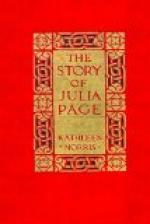How she hated them all, Julia said to herself, raising herself on one elbow to punch her sodden pillow, and sending a hot, restless glance toward the streak of bright light that forced its way in from a street lamp. How selfish, how smug, how arrogant they were, with their daily baths, and their chests full of fresh linen, and their assured speech! What had Sally and Theodora Toland ever done to warrant their insufferable conceit? Why should they have lovely parents and an ideal home, frocks and maids and delightful meals, while she, Julia, was born to the dirt and sordidness of O’Farrell Street?
Barbara—but no, she couldn’t hate Barbara! The memory of that moment of confidence last night still thrilled Julia to her heart’s core. Barbara had been kind to her in the matter of Carter Hazzard, had defended her to-day, in her careless, indifferent fashion. Julia’s heart ached with fierce envy of Barbara, ached with fierce longing and admiration. She tortured herself with a picture of the charm of Barbara’s life: her waking in the sunshine, her breakfast eaten between the old doctor and the young, her hours at her pretty writing-desk, on the porch, at the piano. Always dignified, always sweet and dainty, always adored.
Well, she, Julia, should be an actress, a great actress. But even as she flung herself on her back and stared sternly up at the ceiling, resolving it, her heart failed her. It was a long road. Julia was fifteen; she must count upon ten or fifteen years at least of slavery in stock companies, of weeks spent in rushing from one cheap hotel to another, of associating with just such women as Connie and Rose. No one that she knew, in the profession, had bureaus full of ruffled fresh linen, had a sunshiny breakfast table with flowers on it—
Julia twisted about on her arm and began to cry. She cried for a long time.
True, she could marry Mark, and Mark would be rich some day. But would Barbara Toland Studdiford—for Julia had married them as a matter of course—ever stoop to notice Julia Rosenthal? No, she wouldn’t marry Mark.
Then there was her mother’s home, over the saloon. Julia finally went to sleep planning, in cold-blooded childish fashion, that if her father died, and left her mother a really substantial sum of money, she would persuade Emeline to take a clean, bright little flat somewhere, and leave this neighbourhood forever.
“And we could keep a few boarders,” thought Julia drowsily, “and I will learn to cook, and have nice little ginghams, like Janey’s—”
The amateur performance of “The Amazons” duly took place on the following night, with a large and fashionable audience packing the old Grand Opera House, and society reporters flitting from box to box between the acts. Julia found the experience curiously flat. She had no opportunity to deliver to Barbara a withering little speech she had prepared, and received no attention from any one. The performers were excited and nervous, each frankly bent upon scoring a personal and exclusive success, and immediately after the last act they swarmed out to greet friends in the house, and Babel ensued.




